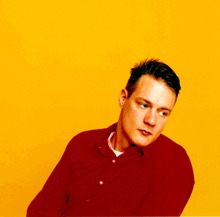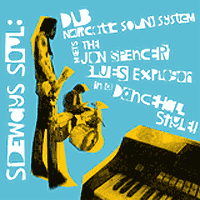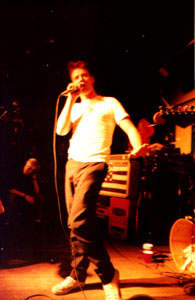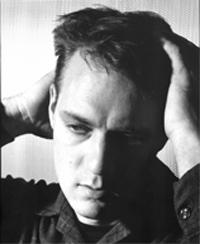

by Kat Kinsman
There's at least one moment in everyone's life when the whole world is balanced on the edge of a brand-new song, and it never spins for them quite the same way again. The day I went off to college, filling closets and tacking up posters, my new roommate put Beat Happening's "Black Candy" on the stereo. Hearing Calvin Johnson's impossibly deep, sternly sexy off-key howls and croons about candy, sex, playhouses and beehives knocked me off the axis of everything I'd ever thought about how music was supposed to sound. Beat Happening's childlike, feral songs embodied the life force of youth in rebellion, and that moment set the tone for the rest of my college years. Future projects of Calvin's, bands like the Halo Benders and Dub Narcotic Sound System, as well as collaborations with artists like Beck, Heavenly and the Jon Spencer Blues Explosion, have never failed to thrill me with their energy, innovation and endless faith in the power of the simple pleasures of life.
At the heart of all this is Calvin's label, K Records. Since 1982, K has been putting out music in the key of DIY, and a recent message on the K website explains the label's driving force as "exploding the teenage underground into passionate revolt." K has put out records and collaborated with artists working in genres ranging from twee and punk to dub and reggae, all the while never straying from the central idea of the K collective—the power of the kids.

 What is happening to the kids? So much of the focus of your music and K Records is corralling the spirit and energy of the kids, but it seems as if they've gone bad. There seem to be a lot of angry teenagers out there. What is happening to the kids? So much of the focus of your music and K Records is corralling the spirit and energy of the kids, but it seems as if they've gone bad. There seem to be a lot of angry teenagers out there.
 It's OK if they're angry.
It's OK if they're angry.
  Angry is fine. Anger can be positive, but not when it leads to destruction like the gang rapes at Woodstock or the tragedy at Columbine. Angry is fine. Anger can be positive, but not when it leads to destruction like the gang rapes at Woodstock or the tragedy at Columbine.
 It seems pretty all-American to me. Like modus operandi for this culture. It's the way we're raised—it's not really a surprise. People tap into that sort of energy and they exploit it. They take advantage of it to their own ends, and that's what was happening there. In that case it didn't seem to be discouraged. An environment was created where that could grow, rather than one where that sort of behavior is questioned. Questioning that type of thinking and that behavior is the first step. People feel like it's OK and they go for it.
It seems pretty all-American to me. Like modus operandi for this culture. It's the way we're raised—it's not really a surprise. People tap into that sort of energy and they exploit it. They take advantage of it to their own ends, and that's what was happening there. In that case it didn't seem to be discouraged. An environment was created where that could grow, rather than one where that sort of behavior is questioned. Questioning that type of thinking and that behavior is the first step. People feel like it's OK and they go for it.
 Is the music that K puts out your answer to that? Is the music that K puts out your answer to that?
 I think that most of the people we're working with are looking for an alternative to that perspective on humanity. They're either working within their own world which is created because they didn't like the world that existed or they're trying to change the world that exists. I think that's a common thread no matter what kind of music comes out. One of those two perspectives is shared by all the artists we work with. I think that most of the people we're working with are looking for an alternative to that perspective on humanity. They're either working within their own world which is created because they didn't like the world that existed or they're trying to change the world that exists. I think that's a common thread no matter what kind of music comes out. One of those two perspectives is shared by all the artists we work with.
  I was just listening to the new album you did with the Blues Explosion, "Sideways Soul: In a Dancehall Style." What do collaborations like that add to your own music? I was just listening to the new album you did with the Blues Explosion, "Sideways Soul: In a Dancehall Style." What do collaborations like that add to your own music?
 I just feel a lot of freedom. Working with them was really concentrated and there was a good dialogue about what we were doing. We worked really well together, and it was a good feeling to be able to go into a situation, brainstorm and trust that the other person is going to do something good. And they do. This inspires you all the more to come up with a good idea yourself.
I just feel a lot of freedom. Working with them was really concentrated and there was a good dialogue about what we were doing. We worked really well together, and it was a good feeling to be able to go into a situation, brainstorm and trust that the other person is going to do something good. And they do. This inspires you all the more to come up with a good idea yourself.
 How much of it is pre-ordained, and how much of it comes about from the spirit of the moment? Do things just happen that you don't expect at all? How much of it is pre-ordained, and how much of it comes about from the spirit of the moment? Do things just happen that you don't expect at all?
 Yeah, all the time. That's what's great about it. I don't think they had any specific preconceived idea of what was going to happen when they came to Dub Narcotic. In fact, they often were asking me: "What do we do? What should we do? Tell us what to do." That was great because it was a nice way to do a session as opposed to: "Hey everybody, we have these eight songs we have to record right away," and somebody has to go to work, etc. We were just kind of free, and they were very open to suggestions. Once I gave them a suggestion, they acted on it. They interpreted it their own way and came up with something really original.
Yeah, all the time. That's what's great about it. I don't think they had any specific preconceived idea of what was going to happen when they came to Dub Narcotic. In fact, they often were asking me: "What do we do? What should we do? Tell us what to do." That was great because it was a nice way to do a session as opposed to: "Hey everybody, we have these eight songs we have to record right away," and somebody has to go to work, etc. We were just kind of free, and they were very open to suggestions. Once I gave them a suggestion, they acted on it. They interpreted it their own way and came up with something really original.
  A lot of bands have covered your songs. Which versions have you really liked? A lot of bands have covered your songs. Which versions have you really liked?
 I haven't really heard a lot of them. For some reason, it's really hard for me to listen to other people's versions of my songs. Not because I think they're going to be bad, but it just seems like they are probably so much better than I can do it. It's kind of embarrassing, so I haven't really listened to a lot of them. I have heard some of them and they seem pretty good. I like the idea that people can do that. I also think there's certain songs that are just really good songs, but they should just never be covered—like "These Boots Are Made for Walking." No matter who does that song, they sound silly compared to Nancy Sinatra, and a lot of Beatles songs are that way as well. A lot of them are half-and-half. A lot of them it's just, why bother? Some people do have an interesting take on it, but I think that with the songs that people have covered that I've written, people have really made them their own. It's a good feeling when the song has a life outside of what I do with it.
I haven't really heard a lot of them. For some reason, it's really hard for me to listen to other people's versions of my songs. Not because I think they're going to be bad, but it just seems like they are probably so much better than I can do it. It's kind of embarrassing, so I haven't really listened to a lot of them. I have heard some of them and they seem pretty good. I like the idea that people can do that. I also think there's certain songs that are just really good songs, but they should just never be covered—like "These Boots Are Made for Walking." No matter who does that song, they sound silly compared to Nancy Sinatra, and a lot of Beatles songs are that way as well. A lot of them are half-and-half. A lot of them it's just, why bother? Some people do have an interesting take on it, but I think that with the songs that people have covered that I've written, people have really made them their own. It's a good feeling when the song has a life outside of what I do with it.
 I've always liked that when you cover a song, it's not just a remake but more of a deconstruction. On the new album, lyrics from "Love Shack" are threaded all the way through "Fudgy the Whale." I've always liked that when you cover a song, it's not just a remake but more of a deconstruction. On the new album, lyrics from "Love Shack" are threaded all the way through "Fudgy the Whale."
 That happened a lot with Beat Happening: "Oh this song's great!" But instead of covering it, we'd take inspiration from it and put something similar or something different, but it just had that root.
That happened a lot with Beat Happening: "Oh this song's great!" But instead of covering it, we'd take inspiration from it and put something similar or something different, but it just had that root.
 Our music editor wanted to ask me what your favorite karaoke song is.
Our music editor wanted to ask me what your favorite karaoke song is.
 I've never done a karaoke song. I've just never really been in the situation. I've been to a couple of bars with people, but I just didn't want to get up there. Well, actually, Lois asked this for a different interview, and I was thinking "Diamonds Are Forever," which is a great song, or that Elvis song, "Trying to Get to You," from the Sun Sessions. There's also a song by Roy Orbison—"It's Over."
I've never done a karaoke song. I've just never really been in the situation. I've been to a couple of bars with people, but I just didn't want to get up there. Well, actually, Lois asked this for a different interview, and I was thinking "Diamonds Are Forever," which is a great song, or that Elvis song, "Trying to Get to You," from the Sun Sessions. There's also a song by Roy Orbison—"It's Over."
  You're working solo this time around, and I read on the K website that this move was inspired by Jason Traeger. What kind of music will you be performing?
You're working solo this time around, and I read on the K website that this move was inspired by Jason Traeger. What kind of music will you be performing?
 I'm doing some Halo Benders songs because we never play live and I like the songs. I've got some other songs that I haven't already done anything with. Actually some of them are pretty old. Some of them are from about 10 years ago and were never recorded and some of them are new, from the last year or so. I did a show in Portland a few months ago and it was really fun and I did a few songs at Yo-Yo and it just seemed like it was working. The Microphones asked if I wanted to do any shows with them and it just worked out.
I'm doing some Halo Benders songs because we never play live and I like the songs. I've got some other songs that I haven't already done anything with. Actually some of them are pretty old. Some of them are from about 10 years ago and were never recorded and some of them are new, from the last year or so. I did a show in Portland a few months ago and it was really fun and I did a few songs at Yo-Yo and it just seemed like it was working. The Microphones asked if I wanted to do any shows with them and it just worked out.
 Since I've got you on the spot, there's one thing I've always wanted to ask you. My best friend and I wrote you a fan letter in college—the only one either of us have ever sent. We drew little pictures and everything, and you didn't answer. We were crushed. What happened?
Since I've got you on the spot, there's one thing I've always wanted to ask you. My best friend and I wrote you a fan letter in college—the only one either of us have ever sent. We drew little pictures and everything, and you didn't answer. We were crushed. What happened?
 I didn't answer? When was that?
I didn't answer? When was that?
 The early '90s. My friend was especially upset since she'd stuck a dingo sticker on the envelope. She was very proud of it and she thought you deserved it.
The early '90s. My friend was especially upset since she'd stuck a dingo sticker on the envelope. She was very proud of it and she thought you deserved it.
 I know that in the early '90s, we got mail for Beat Happening and for some reason I never answered any of it. I put it in this drawer to answer it and I never did and I think it's all still there.
I know that in the early '90s, we got mail for Beat Happening and for some reason I never answered any of it. I put it in this drawer to answer it and I never did and I think it's all still there.
 Let me know if you find it. Do you have any final positive thoughts you want to share with the kids? I think they could use it.
Let me know if you find it. Do you have any final positive thoughts you want to share with the kids? I think they could use it.
 Well, it's hard when you're a kid. I don't know if as a teenager I knew that everything was going to be OK. I don't know if you can tell someone that, but I wish I could.
Well, it's hard when you're a kid. I don't know if as a teenager I knew that everything was going to be OK. I don't know if you can tell someone that, but I wish I could.
Calvin will be performing with Marine Research, the Microphones and the Rondelles at the Bowery Ballroom on October 28. It would make him very happy if you'd show up early enough to see the Microphones. He will also be playing at Maxwell's on November 3.

Send feedback here.
|
|